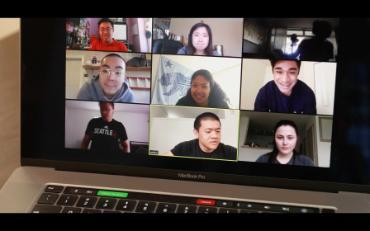 In March 2020, Seattle University was among the first universities to begin remote instruction in response to the COVID-19 pandemic. While there were initially plans to broadly reopen campus in the fall, the unexpected evolution of coronavirus in Washington State continues to change plans.
In March 2020, Seattle University was among the first universities to begin remote instruction in response to the COVID-19 pandemic. While there were initially plans to broadly reopen campus in the fall, the unexpected evolution of coronavirus in Washington State continues to change plans.
Provost Shane Martin, PhD is working with university leadership, faculty and staff to create a safe and healthy student experience. “As we consider reopening, first and foremost for Seattle University is the health and safety of our community – our students, our faculty, staff, and alumni,” says Provost Martin. “That is always going to be the bottom line in making decisions.”
In Seattle U’s current reopening model, residence halls will be single -occupancy, masks will be required indoors and all classrooms and public spaces will be de-densified to ensure six feet of social distancing. In addition, every student who returns to campus will be required to complete a nasopharyngeal PCR test within ten days of arrival. For detailed information about safety measures and enhanced cleaning procedures, visit the COVID-19 website.
For fall, 80-90% of courses will be entirely online and 10-20% of courses will offer a mixture of virtual and in-person coursework. Hybrid classes will include laboratory- , clinical- and performance-based courses. All students, regardless of their degree field, will have the option to study 100% remotely. “The notion of choice is important,” says Provost Martin. “We don’t want to force anyone to return to campus. We’re in an alignment process of trying to adjust faculty desires for mode of instructions with the courses we’re offering and with what students are looking for.”
The quality of mission-driven, holistic learning remains a top priority at Seattle U. SU’s spring quarter student satisfaction surveys scored significantly higher than the institutional average for previous in-person quarters. Faculty and staff consistently pursued innovation in order to create a robust, highly engaging distance learning environment.
“We will build on the success of our spring quarter,” says Provost Martin. Faculty are currently engaging in professional development workshops to increase and strengthen skills for virtual and hybrid learning. With access to new creative teaching methods, platforms and technologies, students will have an improved and enriched experience in the fall quarter.
“I’m confident that by our actions, we are meeting our students where they are,” says Provost Martin. “We are offering a high-quality, impactful education that’s just as strong as anything we’ve ever offered and will help form the next generation of leaders.”

 In March 2020, Seattle University was among the first universities to begin remote instruction in response to the COVID-19 pandemic. While there were initially plans to broadly reopen campus in the fall, the unexpected evolution of coronavirus in Washington State continues to change plans.
In March 2020, Seattle University was among the first universities to begin remote instruction in response to the COVID-19 pandemic. While there were initially plans to broadly reopen campus in the fall, the unexpected evolution of coronavirus in Washington State continues to change plans.